Retro Roadster Comparo + Video
BMW R nineT vs. Honda CB1100 vs. Moto Guzzi Griso 8V SE
One of these three motorcycles is commemorative, the other retrospective, and the third, uniquely orthodox relative to the company’s ethos. Probably not hard to ascertain which bike is being referenced. They seem equally comparable yet disparate in the same moment.
Honda’s, it’s-1978-all-over-again, CB1100 throwback to the heyday of UJMs (Universal Japanese Motorcycle) doesn’t feign to be anything but a modern iteration of the CBs that once were. This is the retrospective bike in the group. A confluence of UJM perfection.
“The bike is the most integrated and seamless of the three,” says the living retroist himself, John Burns. “All systems work well together, best balanced suspension, nicest throttle response and power delivery – but a lot of that is because the performance is lukewarm compared to the others.”
Herein lies the rub with the CB: its meager power output. While we have no qualms with a modern throwback, is it really necessary to instill the 1140cc DOHC, four-valves-per-cylinder, electronically fuel-injected inline-Four with a meager 83 horsepower at its rear wheel? The 1983 CB1100F claimed 108 hp (at its crankshaft, so, minus about 10% for driveline losses, about 97 hp. -Ed.), for chrissake!
Despite a minimal displacement advantage, the two Twins in this comparo, BMW’s horizontally-opposed 1170cc Boxer and Moto Guzzi’s 1151cc 90-degree V-Twin, exerted substantially more effort spinning the dyno’s drum. Out on the road, where it really matters, the Griso exhibited some sloppy fueling qualities, surging slightly at part throttle, which hurt its engine performance scores despite its big-block Chevy soundtrack. Its fuel economy, around 31 mpg, was disappointingly low.
“The nineT’s Boxer-Twin is superior in almost every respect, making more power than the others at every point above 3500 rpm, while also being very competitive at low revs,” says Chief Editor, Kevin Duke. “Its fueling and throttle response are as good as it gets, without snatchiness upon reapplication, no matter if the revs are low or high.”
Further disappointments for the Guzzi include the bike’s weight. At 556 pounds, the Griso weighs 15 more pounds than the Honda and 68 more pounds than the BMW. With 61 inches between contact patches, the Griso measures two or three more wheelbase inches than the nineT or CB, respectively.
2014 Moto Guzzi Griso 8V SE Review
When it comes to suspension, the Griso boasts the only fully adjustable fork and shock of the group. “The Griso’s fork is the best of this bunch, offering a controlled yet compliant ride,” says Duke. “Its rear end isn’t quite so smooth, but bump absorption is aided by the longest wheelbase of this trio.
The sportiest bike of the group, the BMW, offers a shock with preload (via a convenient handwheel) and rebound adjustability, but its fork has no adjustability, despite having the same architecture as BMW’s S1000RR. Not only is the gold fork colorfully inharmonious with the nineT’s black/silver color scheme, but it’s also undersprung compared to the shock’s overly stiff springing.
“The BMW is slightly harsh, with a choppy ride from the rear end, which feels a bit too stiff for the front springs,” says Burns. “I think the brakes are great, but every time you touch them, the front plunges. Over freeway chop, the thin seat and stiff spring conspire to make it not bad, but not as nice as the other two for getting to point B. Which is a shame, because the engine runs nice and vibe-free at 80 mph cruising speed, and its ergos, with a slight forward cant, feel perfectly natural at that speed.”
While the nineT’s brakes are impressively powerful, if not a little grabby, it is the Honda’s front binders, in all their mundane glory that impressed the most. “Kudos to Honda for the front-brake setup on the CB11,” says Duke. “A firm lever works with an optimal pad compound to yield superbly modulatable speed retardation, from just a hair to white-knuckling.”
2014 BMW R NineT First Ride Review
The standard seating position of the Honda also provides the roomiest, most ergonomically comfortable seating position of the three, as well as a nicely padded seat with relative all-day comfort. The Griso’s seat is wide and firm, but its positioning requires a long reach to the flat, gun-metal-grey anodized superbike handlebars. The Guzzi’s passenger accommodations are nice, but there’s no grab handles like on the Honda. Then we have the BMW and its pseudo two-up seating.
“The nineT’s seat is the prettiest of the bunch, with lovely white stitching, but it’s the least tolerable over long distances,” says Duke. “Similarly, its short and narrow rear seat is most likely to draw the ire from a passenger.”
At $14,900 the BMW is the priciest bike here. Unlike the S1000R or RR, this price does not include an impressive electronics suite – not even heated grips – we’ve come to expect from BMW. The nineT does boast an array of forged aluminum components including fender brackets, seat supports, triple clamps and steering damper mount, as well as an aluminum fuel tank. Even-lighter magnesium is used for the valve covers.
+ Highs
- One of the most user-friendly motorcycles you can buy
- Near-perfect ergos if you’re within six inches of 5’8”
- You’re sitting on history every time you climb on
– Sighs
- The original CB was famous for out-horsepowering the competition
- So perfect it can seem a little bland
- Engine is a little vibey upward of 75 mph in spite of rubber-mounted handlebar risers
It should be noted that the retroish Honda rolls on cast wheels, which seem to evoke a later era, but then Honda cherry picked elements from multiple time periods in creating the CB1100. The mags still seem out of vogue, though, considering its ’70s profile. For the other two modern-era bikes here, spokes were chosen for attaching rim to hub.
Weighing 541 pounds, the CB is 15 pounds less than the Griso but 53 pounds heavier than the BMW. Helping the Honda to feel lighter than what the scales tell us is the use of time-period-appropriate narrow tire widths: 110/80-18 front and 140/70-18 rear. “To put that into context, consider the tires on Kawi’s little Ninja 300 share identical widths,” says Duke.
+ Highs
- Charisma beyond most motorcycles
- Sounds as good as it looks
- Fully adjustable suspension
– Sighs
- Unrefined EFI fueling
- Driveline lash
- No ABS
The Griso has radial-mount Brembo calipers fed by steel braided lines, but stopping power came only after a surprisingly firm squeeze. In fact, I had to resort to using three-finger pulling power instead of my standard two-finger arrangement. It’s likely a swap of brake pad material would restore the bite we expect from the Brembos.
Considering the Guzzi weighs nearly 70 road-holding-pounds more than the BMW, the big Italian carries itself well. It’s also $1k less in price than the BMW, but for that kind of money we’d like to see ABS included, as it is on the Beemer. The standard CB we were riding also doesn’t come with ABS, but the Deluxe version does for an extra $1500.
+ Highs
- Retro sexy
- Factory customizable
- Tasty forged aluminum components
– Sighs
- Undersprung, underdamped, non-adjustable front suspension
- Pricey
- Least-comfortable seat
Out of this bunch, the BMW is certainly recognized as the sportiest. It’s combination of relatively light weight and the most power give the nineT an ample advantage in the tight stuff, despite its poorly balanced suspension components. In stock trim, the R nineT can carry a passenger, but that’s not really what this bike was built to do. Our suggestion is: after purchase, remove that unsightly rear subframe (which includes passenger pegs), fit the accessory Aluminum Tail Cover (which gives a tad of under-seat storage in place of the pillion), attach the accessory high-pipe (to help showcase the single-side rear swingarm), and enjoy the nineT for the solo mount it was meant to be.
Retro Roadster Comparo Scorecard | |||
|---|---|---|---|
| Category | BMW R nineT | Honda CB1100 | Moto Guzzi Griso 8V SE |
| Price | 15.0% | 100.0% | 50.0% |
| Weight | 100.0% | 62.5% | 55.0% |
| Engine | 89.2% | 65.0% | 82.5% |
| Transmission/Clutch | 77.5% | 84.2% | 75.0% |
| Handling | 85.0% | 80.8% | 74.2% |
| Brakes | 85.0% | 86.7% | 73.3% |
| Suspension | 73.3% | 82.5% | 88.3% |
| Technologies | 23.3% | 6.7% | 28.3% |
| Instruments | 71.7% | 74.2% | 85.0% |
| Ergonomics/Comfort | 70.0% | 80.0% | 80.0% |
| Appearance | 95.0% | 77.5% | 90.0% |
| Cool Factor | 94.2% | 73.3% | 94.2% |
| Grin Factor | 90.0% | 56.7% | 87.5% |
| Overall Score | 79.2% | 72.2% | 78.7% |
| Price and weight are scored based on objective metrics. Other scores are listed as a percentage of editors’ ratings in each category. The Engine category is double-weighted, so the Overall Score is not a total of the displayed percentages but, rather, a percentage of the weighted aggregate raw score. | |||
With such a loose class of motorcycles, the scores from our editors varied more than usual. All three bikes are appealing in their own ways. The Honda is the nicest and easiest to ride; the Guzzi exudes quirky Italian charm; and the BMW boasts top-shelf finish detailing and the sportiest performance.
In the end, it was the Guzzi and the BMW trading blows for the class win. Burns and I like the Guzzi a smidge more than the BMW for no better reason than we think it’s a little cooler, with a touch of the world’s-most-interesting-man-charisma the BMW just can’t match. Meanwhile, Duke’s clear preference was for the uber-cool R nine-T and its performance advantages.
View the full gallery of images
Determining the victor couldn’t have been closer. I chose the Guzzi over the BMW by only a quarter point (103.0 vs 103.25). Burns had a wider spread between the two bikes, but when combined with Duke’s scores, it wasn’t enough to overcome the bike we chose as this year’s Best Standard.
“The Griso is definitely a cool machine, but I think the nineT is cooler, and the performance of its chassis and engine are undeniably superior,” says Duke.
By unanimous decision, though, the Honda CB1100 came in last, but it wasn’t a distant last; just 16.25 points separated second from third. At $10,399, the Honda is the least expensive bike here, but that doesn’t make up for its lackluster performance. Ridden alone, outside of a direct comparison test, the Honda seems a stellar motorcycle when measured simply by its pure proficiency at being a motorcycle. So, if you’re not a multi-bike owner looking to expand the caliber of your personal arsenal, the Honda could be the best choice for single-bike ownership.
Retro Roadster Shootout Specs | |||
| BMW R nineT | Honda CB1100 | Moto Guzzi Griso 89V SE | |
| MSRP | $14,900 | $10,399 | $12,990 |
| Engine Capacity | 1170cc | 1140cc | 1151cc |
| Engine Type | Opposed-Twin | Inline-Four | 90-degree V -Twin |
| Horsepower | 101.5 @ 7700 | 83.5 @ 7200 | 95.1 @ 7200 |
| Torque | 76.1 @ 6300 | 65.8 @ 5800 | 73.2 @ 6400 |
| Bore x Stroke | 101mm x 73mm | 73.5mm x 67.2mm | 95 x 81.2 mm |
| Compression | 12.0:1 | 9.5:1 | 11:01 |
| Fuel System | EFI | PGM-FI | EFI |
| Transmission | Six-speed | Six-speed | Six-speed |
| Final Drive | Shaft | Chain | Shaft |
| Frame | Tubular steel | Tubular steel | Tubular steel |
| Front Suspension | 46mm inverted fork, 4.7 inches of travel | 41mm fork, spring-preload adjustability , 4.2 inches of travel | 43mm fork, spring preload, rebound and compression damping adjustability, 4.7 inches of travel |
| Rear Suspension | Monoshock, spring preload, rebound adjustability, 4.7 inches of travel | Dual shocks, spring preload adjustability , 4.5 inches of travel | Monoshock, spring preload, rebound, compression adjustability, 4.3 inches of travel |
| Front Brakes | Dual, four-piston calipers, 320mm discs | Dual, four-piston calipers, 296mm discs | Dual, four-piston calipers, 320mm discs |
| Rear Brakes | Single caliper, 265mm disc | Single caliper, 256mm disc | Single caliper, 282mm disc |
| Front Tire | 120/70-17 | 110/80-18 | 120/70-17 |
| Rear Tire | 180/55-17 | 140/70-18 | 180/55-17 |
| Seat Height | 30.9 inches | 31.2 inches | 31.4 inches |
| Wheelbase | 58.1 inches | 58.7 inches | 61.0 inches |
| Rake/Trail | 25.5º/4.04 inches | 27.0º/4.4 inches | 26.30º/4.25 inches |
| Curb Weight | 488 pounds | 541 pounds | 556 pounds |
| Fuel Capacity | 4.8 gal | 3.9 gal | 4.4 gal |
| MPG | 39.5 mpg | 44.8 mpg | 31.2 mpg |
| Colors | Black | Black | Black/Silver |
A former Motorcycle.com staffer who has gone on to greener pastures, Tom Roderick still can't get the motorcycle bug out of his system. And honestly, we still miss having him around. Tom is now a regular freelance writer and tester for Motorcycle.com when his schedule allows, and his experience, riding ability, writing talent, and quick wit are still a joy to have – even if we don't get to experience it as much as we used to.
More by Tom Roderick



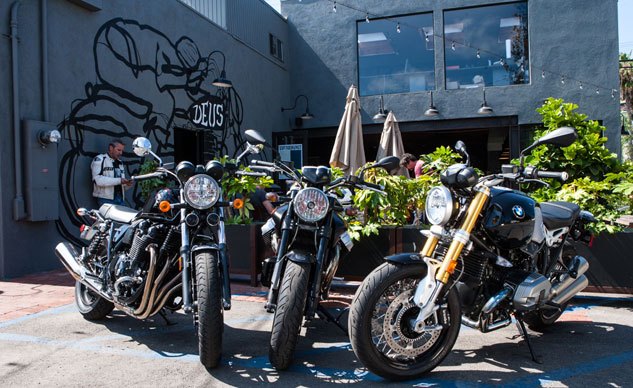
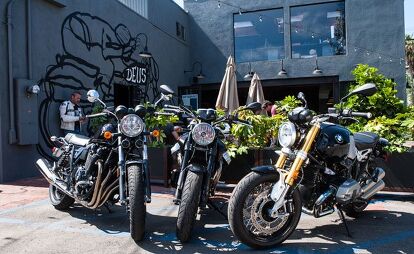




























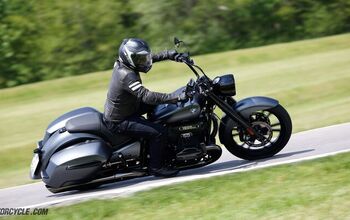
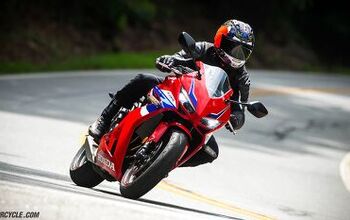
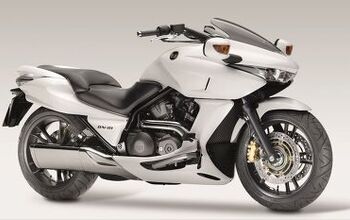

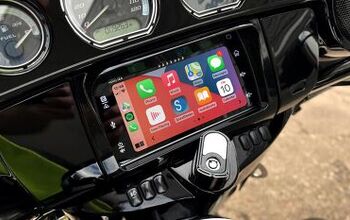
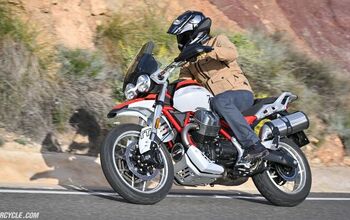
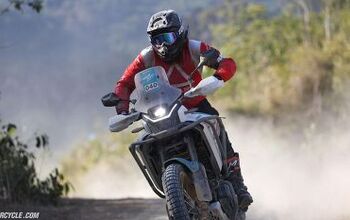
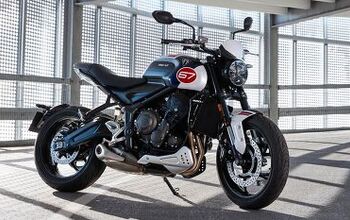

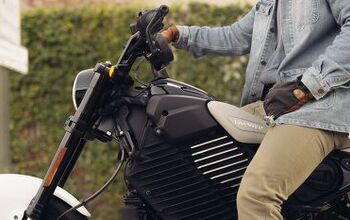
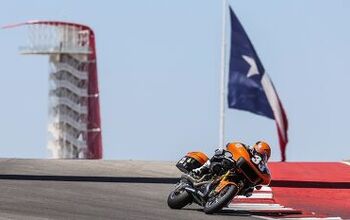
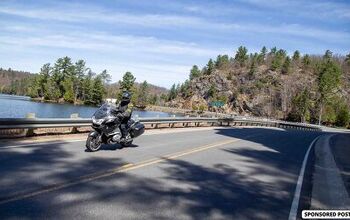



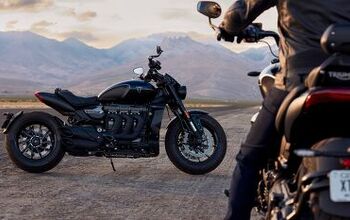
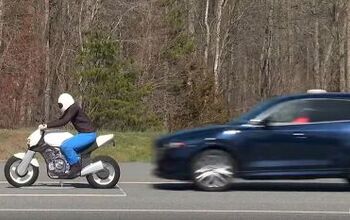
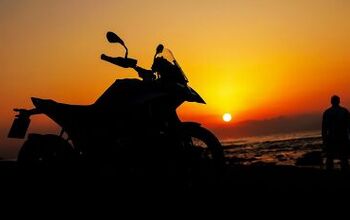
Comments
Join the conversation
I place realibility high on my preferences. There is nothing worse breaking down on a busy hwy or out in the bush miles from no where with no help at hand. Here in Australia breaking down in the outback can lead to dire consequences. It's nice to have those boutique bikes but the Jap bikes out here in the bush is all we trust.
I have an r1200r and love it. Yes it has every option and why not. Put risers and a smallish windscreen and can ride it all year in Florida. It is a better rider then all three of these bikes. One comment to add on the article, BMW has that 3 year, unlimited warranty which is top of the line so give points for that.